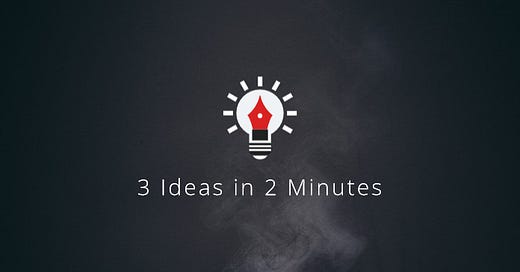#185: Ulysses Contract, Unexpected Hanging Paradox & the Climber’s Conundrum
3 Ideas in 2 Minutes on Your Future Self
I. Ulysses Contract
You and your future self aren’t the same person. You know that. So you can take measures to prevent future you from making foolish decisions by way of a Ulysses Contract, a free agreement designed to bind yourself in the future.
The contract has its origins in Homer’s epic poem The Odyssey. The hero Odysseus (Ulysses) is returning home from the Trojan War. He and his crew need to sail past the island of the Sirens, female creatures who sing songs that enchant sailors and lead them to their deaths. Odysseus has his men fill their ears with beeswax so they can’t hear the singing. But Odysseus wants to listen. So he asks his men to tie him to the mast of the ship and orders them not to untie him no matter how much he begs. It works.
Setting an alarm in the morning is a less lethal everyday example of a Ulysses Contract. Knowing that your sleepy future self will be tempted to hit the snooze button and sleep in, you place the alarm clock across the room. This way, you have to physically get out of bed to turn it off, making it (more) likely that you’ll stick to your plan of getting up on time.
II. Unexpected Hanging Paradox
Imagine a prisoner. The judge tells him on Sunday that he’ll be hanged at noon on a weekday in the following week. However, the execution will be a surprise to him. The prisoner won’t know the day of the execution until the executioner comes to get him. So the inmate tries and deduce the day of his hanging.
It can’t be Friday. Because if he’s still alive on Thursday afternoon, he’ll know that the hanging must be on Friday. No surprise there. But if he can’t be hanged on Friday, then Thursday won’t be a surprise either. Because if he’s still alive at the end of Wednesday, the hanging must be on Thursday. The same goes for all other days of the week. This can only mean one thing: he won’t be hanged at all.
This self-referential conundrum is known as the Unexpected Hanging Paradox. Among other things, it plays with our interpretation of the word surprise. So imagine the prisoner’s shock when he’s hanged anyway.
III. Climber’s Conundrum
There’s a constant conflict between the goals of present and future you. I’d like to call it the Climber’s Conundrum. Here’s a way to solve it:
Mountains should be climbed with as little effort as possible and without desire. The reality of your own nature should determine the speed. If you become restless, speed up. If you become winded, slow down. You climb the mountain in an equilibrium between restlessness and exhaustion. Then, when you’re no longer thinking ahead, each footstep isn’t just a means to an end but a unique event in itself.
This leaf has jagged edges. This rock looks loose. From this place the snow is less visible, even though closer. These are things you should notice anyway. To live only for some future goal is shallow. It’s the sides of the mountain which sustain life, not the top. Here’s where things grow.
—Robert M. Pirsig, Zen and the Art of Motorcycle Maintenance
🐘
Have a great week,
Chris
themindcollection.com



